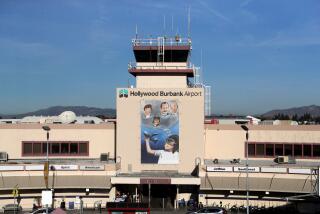2 Lawmakers Urge Mandatory Noise Curfew at Burbank Airport
- Share via
BURBANK — Two local congressmen Friday released a letter they wrote to the Federal Aviation Administration urging the agency to impose a mandatory noise curfew on flights at Burbank Airport.
The idea of a mandatory curfew--replacing the present voluntary one--has been gaining support in several quarters.
The Sept. 24 letter to FAA Administrator Jane Garvey from Reps. Howard L. Berman (D-Mission Hills) and Brad Sherman (D-Sherman Oaks) was written as Burbank officials and residents battled over a plan by Reno Air to begin 6:40 a.m. flights from Burbank to San Jose.
The Nevada-based air carrier backed away from that proposal. But that did not quiet critics who have long maintained the existing noise restriction--the voluntary 10 p.m. to 7 a.m. curfew--is not enough to protect the airport’s neighbors.
Three airlines do not abide by the voluntary restriction, scheduling three takeoffs between 6 a.m. and 7 a.m. each day.
Under federal law, only the FAA can impose mandatory restrictions on air traffic.
FAA officials had no immediate comment on the request by the congressmen.
Berman and Sherman said a mandatory curfew, possibly in tandem with other unspecified mitigation measures, “could break the stalemate” over construction of a 19-gate terminal building, the centerpiece in the fight over noise.
The city of Burbank has been battling the terminal plans--in the political arena and the courts--during a years-long feud with the Burbank-Glendale-Pasadena Airport Authority. The city argues the terminal would lead to more aircraft noise; the authority contends airport traffic would grow regardless and that the terminal, needed to handle the load, would not affect that.
“The purpose was to urge the FAA administrator to look at all the possible actions for adopting noise restriction,” said Berman aide Tom Campbell, who denied there was any connection with the congressmen’s request to the FAA and the Reno Air controversy.
*
The legislators did not specify how the FAA would deal with the complicated formal review process that leads to such restrictions, known as a Part 161 study, which was adopted by the agency in 1990.
Peter Kirsch, who serves as Burbank’s special legal counsel on airport issues, said federal law allows the airport authority to impose tougher noise rules if they would be needed to comply with restrictions that predated 1990, when the FAA changed its procedures. One example was state law requiring the airport to reduce noise.
“There are lots of different avenues the airport authority can use to legally implement curfews,” Kirsch said. Berman and Sherman “are endorsing the avenue that does require going through the Part 161 study and are encouraging the FAA to secure the approvals to implement a curfew immediately,” he said.
Airport officials said they have heard those arguments before from Kirsch and dismissed them as “legal pandering.”
“We disagree completely with Burbank’s attorneys,” Burbank Airport Executive Director Tom Greer said. “We don’t see the alleged loophole in federal law. If we did, we would have used it a long time ago.”
*
Greer said the airport authority has never been opposed to a curfew or a noise cap and was exploring how such limits could be implemented, but would not violate federal law by imposing them unilaterally.
Greer said he sent a letter this week to airlines that operate from the airport, asking them to consider voluntarily agreeing to a curfew “before we spend $1 million and our time for a 161 study.”
“If they are willing to accept the restrictions, let’s do it now,” he said. “Let’s write it up, sign it, send it to the FAA and see if they’ll bless it.”
More to Read
Sign up for Essential California
The most important California stories and recommendations in your inbox every morning.
You may occasionally receive promotional content from the Los Angeles Times.













